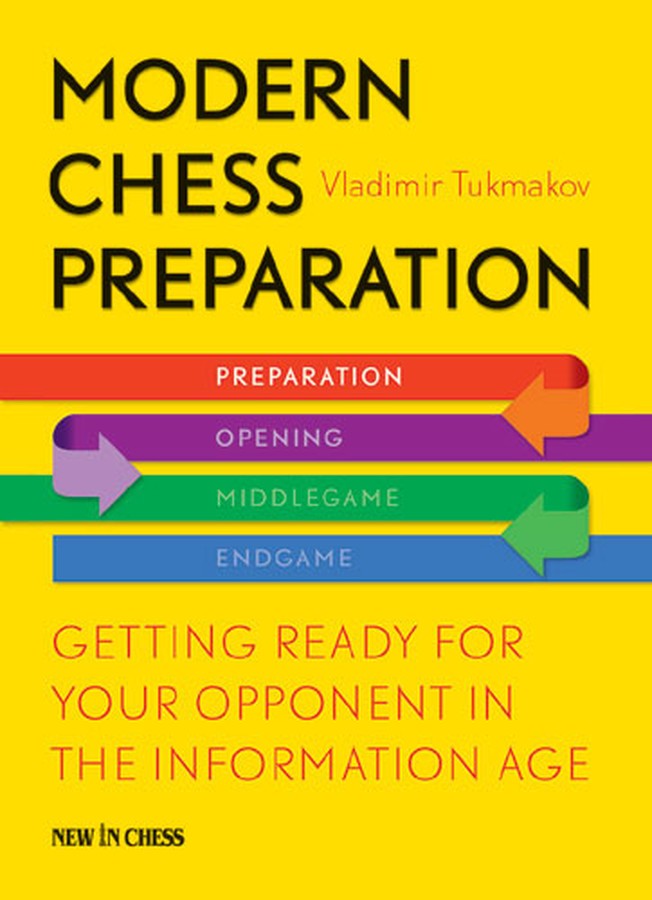| Nivå | B-D |
| Utgivelsesdato | September 2012 |
| Forfatter | |
| Pris | 305 NOK |
Modern Chess Preparation
Getting Ready for Your Opponent in the Information AgeForberedelser både for et enkelt parti og like mye for alle kommende partier er rimeligvis en nøkkel til suksess i sjakk. Denne boka handler om alt dette, fra en mann som har like imponerende overblikk over hele sjakkspillet som innblikk i konkrete detaljer.
Ja, dette er en fenomenal bok både å lese og studere. Forfatteren setter faktisk det hele strålende på plass ... allerede i innledningen sin i boka:
Preparation: the key to victory
Chess is some times described as a model of life. Garry Kasparov even devoted a weighty tome to that topic. In this book, however, the author will try to avoid such a temptation. The subject will be exclusively the preparation for a game of chess or, at most, the preparation for a life in chess.
A game of chess is a struggle between two individuals. Understanding the strengths and weaknesses of your opponent, and having a sober awareness of your own shortcomings, will pay dividends at any level, for beginners up to World Champions. Even if you and the person sitting opposite you have only recently grasped the rules of the game, knowing a simple mechanism – bringing the queen out to h5 and the bishop to c4 with mate on f7 to follow – can bring fantastic results when you’re just starting out. Of course, sooner or later your opponent, puzzled by such a turn of events, will either by himself or with the help of a chess manual demonstrate the inadequacy of such cavalier attacks. And the weapon that had brought lightning victories will backfire against its owner. However, having tasted such success you’ll have caught the preparation bug, and you won’t be able to stop yourself looking for more sophisticated means of surprising your opponent. That constant battle between the sword and the shield, which never relents even for a day, is the essence of the art of modern chess preparation.
Over the last hundred years and more chess has travelled a long way from coffeehouse games played for small stakes to be come a complex, multi-faceted activity based on an unusual mixture of art, sport and science. As chess has developed the sporting component has squeezed out art to an ever-greater degree, while the recent appearance and rapid improvement of computer programs has given chess a new and unexpected boost.
With the emergence of the first official World Champion in 1886 the battle for that coveted title became the goal and meaning of life for many, adding spice and drama to the development of chess. World Championship matches were of ten turning points in the wonderful game’s development.
The first part of this book reflects the complex journey chess players have undertaken from the game’s amateur roots to its current professional status. There’s a theory that claims the chess World Champions couldn’t have been more representative of the epochs in which they lived, but it’s just a beautiful hypothesis. Steinitz, Lasker and Capablanca don’t provide the most convincing of evidence for it. Back then chess was only taking its first steps on the road to ‘state hood’. The laws of this specific realm of human activity were just beginning to be established and had little in common with the processes taking place in parallel in real life. The more professional chess be came the more it started to depend on the realities of the surrounding social environment.
The contribution individual chess players have made to establishing and developing the art of preparation is far from proportional to their sporting achievements; there are different heroes and prize-winners. In the conventional ranking of historical chess players Jose Raul Capablanca is above Max Euwe, while the position of Alexander Alekhine is in comparable to that of Akiba Rubinstein. In this book, however, the name of Euwe is mentioned much more of ten than that of the Cuban genius, and Rubinstein’s opening discoveries are placed on a par with the creative achievements of the Fourth World Champion.
An amazing harmony was attained between chess champions and society in the Soviet Union. It’s no accident that it was thanks to Soviet chess players, headed by Mikhail Botvinnik, that a break through was achieved in treating chess as a serious profession, while preparation became systematic. Botvinnik, Smyslov, Tal, Petrosian, Spassky, Karpov and Kasparov – all of them brought some thing new to the art of preparation.
Paradoxical as it sounds, the contribution of the universally-recognised chess geniuses is less significant in this regard. Robert Fischer was no exception, although his dominance over his contemporaries was overwhelming. The 1972 match against Boris Spassky put a stamp on the American’s hegemony, while at the same time inaugurating an era of total confrontation in chess. Karpov’s matches that followed against Kortchnoi and Kasparov were even fiercer, demanding previously unprecedented mental resilience from the players. Opening preparation also reached a new level. In Karpov’s matches against Kasparov it be came the norm for players to adopt one and the same system with both colours, while games would often end before the home analysis had run out. It was no accident that the clash between those two great players and arch-rivals coincided with the dawn of the computer era in chess.
A separate chapter has been devoted to modern chess preparation and the ever-growing role of the computer. This author still has a good recollection of methods of preparation that you’d be hard-pressed to describe as anything other than archaic nowadays. It would be naive to underestimate the influence of computer programs on the game, but at times unconditional respect for the evaluations of our Metal Friend (or MF, as it will feature in this book) is combined with a note of irony. After all, for the moment it’s still humans who decide the fate of a game of chess.
Finally, the concluding part of this book is devoted to games where the fate of a tournament, match or some times even a player’s whole sporting career was decided. The secret of success in chess can be strange and some times elusive. The components of the mysterious formula are well-known: talent, memory, willpower (character), capacity for work and also good health. But the final outcome is by no means decided simply by a sum of the parts, and it seems impossible to construct a formula based on the rankings of past and present chess players.
There’s also an other component that’s by no means unimportant – a love of chess. That works as a powerful battery to fuel memory, hard work and, to a certain extent, will-power. But if love is irrational and talent is granted from above, then all the rest can and needs to be trained and developed. This book was conceived as a guide to that extremely difficult and subtle process.
Although a modern chess player’s preparation consists mainly of working on the opening, this book isn’t solely about that. Firstly, chess fans aren’t only made up of professionals who devote all their time to chess. Secondly, and this is perhaps the main point, chess isn’t limited to the opening. So although the emphasis is placed on theoretical preparation, absolutely all the games in this book are given in full. The overwhelming majority of the examples are taken from the games of top-class players, so it’s very interesting to follow how the advantage gained in the opening stages is ultimately converted into a win. It’s no less instructive to analyse the games in which for what ever reason that failed to happen.
This book is in tended for all those who’ve kept faith in their capacity for self-improvement and who want to increase their practical strength. Of course, the potential of those who’ve linked their professional future to chess inevitably differs from that of those who spend time on their favourite game only as a hobby. For the benefit of those ‘club players’ each chapter is followed by special recommendations and advice. If the reader can gain some thing new and useful for him/her then the author will consider his task accomplished.
Vladimir Tukmakov Odessa, June 2012
| Innbundet? | Nei |
| Type | Bok |
| Språk | Engelsk |
| Antall sider | 286 |

